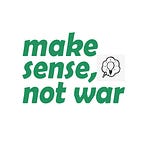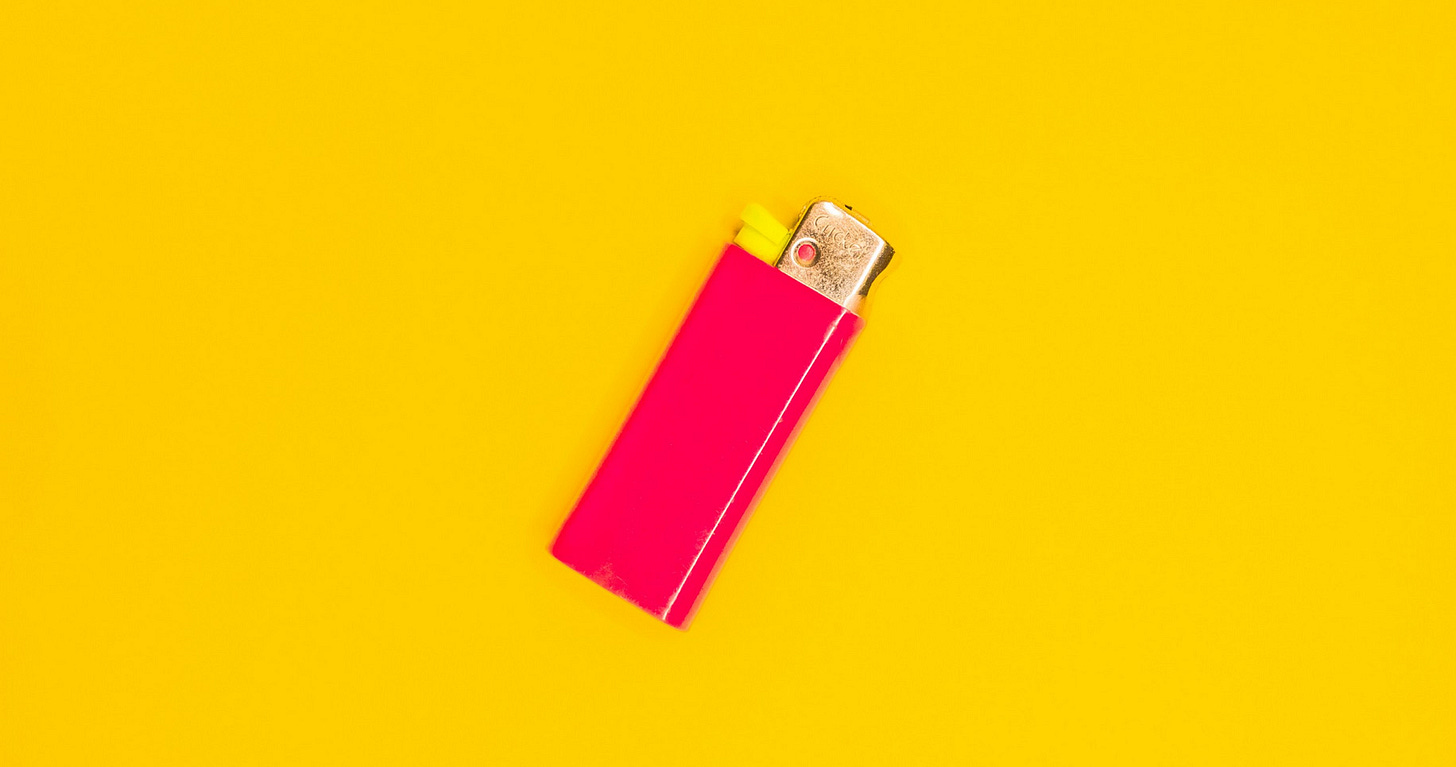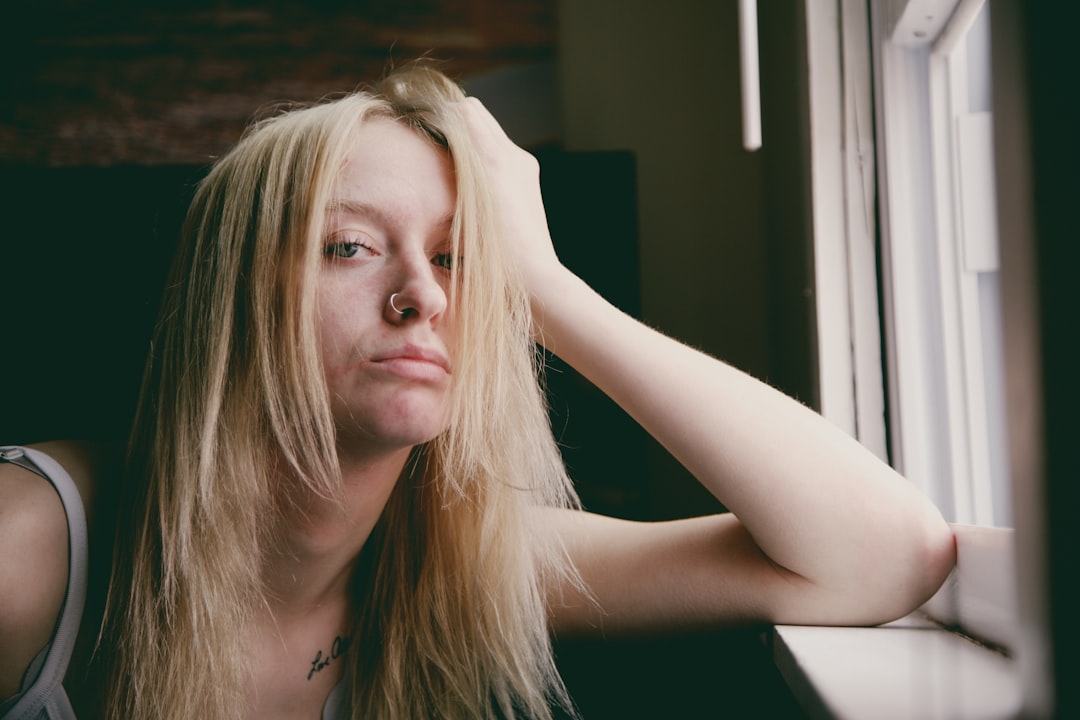Artists make us look at our shit.
I have an architect friend who takes that quite literally. He makes art out of humanities waste products. Preferably big.
He is convinced we can live in a world where everything can be re-used. His artworks are the living proof of his philosophy.
Is art is telling us only one thing; Own your stuff, Western people
Buy only stuff that you can tear apart, repair and put back together.
Africa is showing us this for decades, and now we’re in crisis, we start to listen and look for alternatives. Here are a few.
To solve any huge issues, start simple
Own your lighter.
What?
Yep, it goes like this.
A lighter is made out of 9 different materials. In my artist's friend's ideal world, most of these parts can be re-used in another utensil after your lighter dies.
The small firestone still works after the lighter dies, the plastic container can contain other liquids than gas, the small wheel can cut things. Become creative, find a new home for the things that still work.
A clever example of a circular economy on a consumer level. It all starts with awareness.
Stop buying a pack of 5 lighters that you know you will throw away after use. Buy old classic stuff on online marketplaces. Go for quality products only, they are still floating around in the world.
I used up my first car, a Peugeot 205 petrol, completely. It choked out its last breath over 500.000 well-served kilometers. I knew what was under the hood as my back-pocked, even when I have three left hands. The 205 was an example of pre-china capitalism where people actually made things that were close to UN-breakable.
In most African countries, ironically, people only can afford to be surrounded by unbreakable stuff. The continent invented reusables. All we need to do is turn our heads to Africa, where real richness still can be found in the very thing we lost a while ago.
How Africa invented circular economy
As the Western privileged world is slowly turning into hunger game societies, the impoverishing middle-class is turning their heads to Africa to get a masterclass in real sustainable living.
Africa is leading the world when it comes to creativity and repairing the tons of waste we, the western world, dumped there. By being the second-hand economy of the world, Africa has become the leading continent in sustainability.
In most African countries, everything not repairable has a short span of life and probably won’t be available at all since most Africans never really had much of a choice. Africa invented circular economics from circumstances.
Here in the west, we still believe we have a choice, but time, money, resources and hope is running out. We need to wake up from that illusion.
Most Africans are natural-born minimalists. Not that they had a choice, but turning repairing everything you own into a lifestyle makes you happier people than most of us, Westerners.
We live cheap lives since we took on the habit to surround ourselves with cheap things. With 2 clicks on an App, Amazon will bring you a new, cheap, similar thing tomorrow.
We chose speed over quality and believe efficiency will fill our souls.
It doesn’t. All it does is creating a craving for more. Deep inside we feel empty and cheap.
Stop turning your life into an empty desert with one-time used product graves everywhere. Get rid of your stuff before the stuff get rids of your soul.
Go one step further — become a minimal lifestyler
You will be so much happier when you relate to everything around you. By taking responsibility for it, ownership. When you do it with your wife, you can do it with your life. And your stuff too.
By repairing stuff you connect to the spirit of things.
What would it look and feel like when you step out of the cheap & easy to get & then throw away replacement Amazon economy? This requires you have way less stuff. Essentially, it will provide for more freedom.
There is a movement built around this concept, the Minimalists.
Minimalism is a tool to rid yourself of life’s excess in favour of focusing on what’s important — so you can find happiness, fulfillment, and freedom. (as stated on this website)
Minimalism has become a lifestyle. It’s a real movement. The founders claim to have reached over 20 million followers worldwide. Now I hear you think: Should I only surround myself now with repaired, second-hand stuff that is old and cranky?
That’s not really what minimalism is about. It is finding your own way to become freer from old conventions in your mind.
To surround yourself with stuff gives you also a certain attachment with it. It takes up time, energy, and focus. A good example is clothes.
What would happen if you went through your cloth and give all the cloth away that you have not touched for a year? First, you would have to let go of the attachment to that special jacket that looked great when you bought it, but you have worn it exactly 3 times in 3 years. You will definitely feel lighter after giving it away.
By giving more stuff away that you rarely use, you start to create more and consume less, focus more on health, pursue your passion. Live more in the moment.
Takeaway
Whenever something breaks in your life, ask yourself if you can repair it, or re-use the elements it is made out of.
Step out of the crazy capitalist arena that sells you cheap plastic shit from China, child labored cloth from India, or coffee for 5 dollars where 23 middlemen took 95% of the money from the poor farmer in Kenya who only receives 5 cents.
Start repairing, start giving back, start living more minimal.
Keep the lighter example in your mind. This can work with literally everything. Buy quality products that can be repaired. The only condition they need to meet is that you can tear it apart, like an old car.
Realize your consumer power.
Forget about Amazon. Its trillion carton boxes economy has become the symbol of our capitalist focus on speed and efficiency, instead of slowing down and making a real connection with everything around us. With the spirit of things.
You don’t need 7227 things, exercise to be happy with 21 things, like this artist.
Stop living a cheap life by surrounding yourself with cheap one-time-use stuff. Try living a minimalist lifestyle. Own the things around you like they’re are an inseparable part of yourself.
When enough people start doing this, we finally will get the earth back in its natural and organic state.
Lucien Lecarme
When you like my words, consider supporting me by becoming a paid contributor and receive extras. Click the subscribe button and choose your plan.












